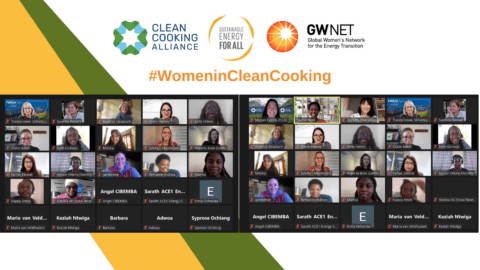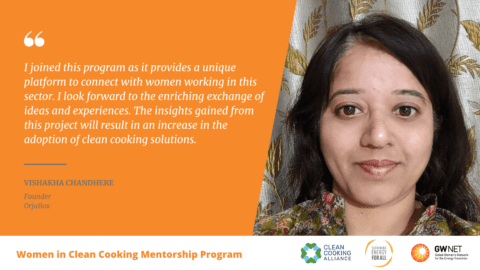GWNET brings you the 11th instalment of the “Meet the Women in the Energy Transition” series which celebrates the work and achievements of the women who are part of GWNET’s 3/2020 Mentoring Programme. This mentoring programme is made up of 26 mentee-mentor tandems, with mentees from over 20 countries. Meet GWNET mentor, Christiana Hageneder, a senior project manager working at GIZ in Germany.
1) Tell us a little about yourself. What do you love most about what you do?
The door opener to the sustainable energy sector for me was a postgraduate master in facilities and energy management. This enlarged my architect’s perspective to include the whole life cycle of built infrastructure and the energy supply of cities, countries and also globally. Now I am very happy to be able to combine my infrastructure engineering background with my vision for a clean energy transition.
2) What were your goals when you started working in sustainable energy? Have these evolved?
The overall goal is still the same, enabling a sustainable energy transition, but my ways of working and the regional outreach to achieve the goal have evolved. I started at the local level working on projects in my home country, moved to the European level, later moved to work outside of Europe and since a couple of years, I have been working in a global program cooperating with many countries.
3) How have you adapted to the challenges caused by the COVID-19 pandemic and what advice would you give someone going through similar challenges?
With the working environment and tools that I already have, I was able to adapt very well to the challenges that COVID-19 brought us. Some years ago, when I started working on a global level I had to face the challenge that our cooperation partners are mostly far away and even the core team I was working with was spread out in several countries.
Therefore we had to adapt to this situation already some time ago. My advice is: at the beginning of a working relationship there should be a moment where you get to know each other personally, but later on, many things can be organized and discussed online. Establish with the working partners a mutually well-accepted communication schedule. And using video once in a while in your communication helps a lot to get closer personally.
4) What are the opportunities for sustainable energy growth in your country?
As I work globally, I might not be best placed to talk about a single country. On a more general basis, the biggest opportunity for growth worldwide is the growth in energy efficiency. We are used to wasting energy because it was cheap but nowadays energy and natural resources are becoming scarce.
Fortunately, today we have great ways – e.g. digital means – to use only the minimum necessary energy for the services and processes. And this minimum energy we need can now be covered by renewable energy.
5) What challenges have you faced in the sector? Can you tell us how you overcame (or are overcoming) this challenge(s)?
The sector is a classic for “mansplaining”, where you see that many of your male colleagues often have no problem with sharing their knowledge everywhere with great conviction. When you are young this might be a big challenge, especially if you are constantly questioning yourself and your skills – which women do more often than men. Therefore, it’s very important to stop questioning yourself.
To find a good work-life balance is also key for getting at ease with what you do. There is no recipe for a good work-life balance that fits for all because there are so many different circumstances and lifestyles. Just one tip: similar to the professional life, do not try to be perfect and do everything alone in your private life neither – let others help you or let others do things around you (even if you think you could do it better, perfectionism doesn’t help).
6) Why did you join the GWNET Mentorship Programme? What do you hope to achieve?
The mentorship programme is a great way to support and exchange with other women. On the one hand, I might be able to share some of the experiences I already made, help colleagues to extend the network in the sector. And on the other hand, I am very curious to exchange with others, that are younger in the sector and maybe from other regions or with other cultural backgrounds.
7) What advice would you give to women hoping to join the sustainable energy sector?
If you intend to work in the sector, it can be very rewarding on a personal side because the sustainable energy sector is of utmost importance for our future development and existence. The sector includes several factors that are key: the burning of fossil sources for energy production today is the main driver of climate change and at the same time energy is also essential to keep today’s economy running.
Therefore, working for sustainable energy can bring you a lot of satisfaction while at the same time you need to be careful not to exploit yourself because of this intrinsic motivation.
Read more about GWNET’s mentoring programmes here.











